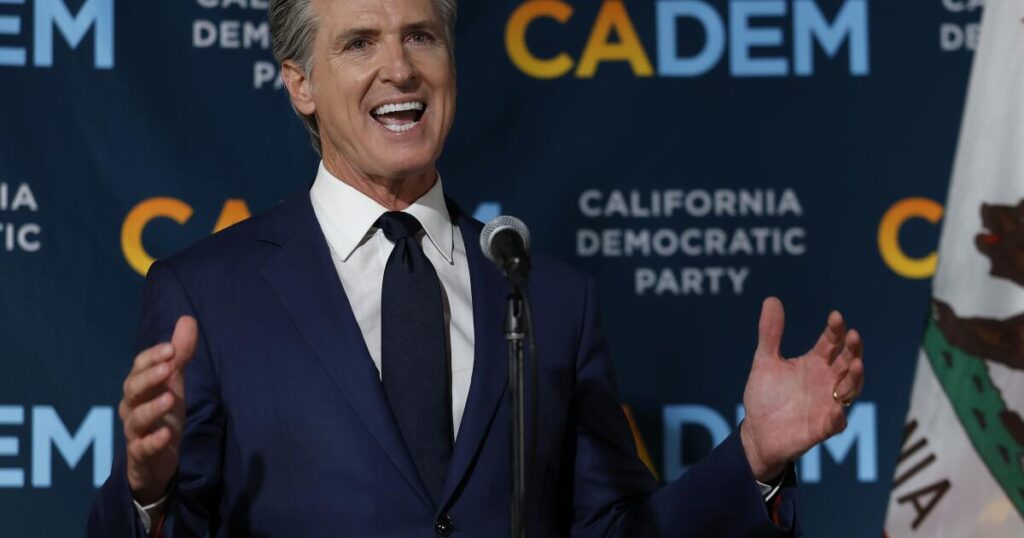A week before California’s special election, Gavin Newsom made news by doing something practically unheard of. He told donors to stop sending money to pass Proposition 50.
It was a man-bites-piranha moment — a politician turning away campaign cash?!? — and amounted to a victory lap by California’s governor even as the balloting was still underway.
On Wednesday, less than 12 hours after the polls closed, Newsom sent another email. This one thanked backers for helping push the gerrymander measure to landslide approval — and asked them to open their wallets back up.
“Please make a contribution,” he pleaded, “to help us continue to go on the offense and take the fight to Trump.”
One campaign ended. Another seamlessly continued.
Though he’s been publicly coy, Newsom has been effectively running for president for the better part of a year, something even the most nearsighted observer can see. One envisions the restless governor, facing the end of his term, sitting in the Capitol and crossing days off his official calendar as he longingly gazes toward 2028.
Setting aside its dubious merits, Proposition 50 was an unequivocal triumph for Newsom.
He took a risk that an esoteric subject — congressional map-making — could be turned into a heartfelt issue. He gambled that voters would overlook the cost of a special election — close to $300 million — and agree to hand back the line-drawing powers they seized from Sacramento insiders and politicians who put their own interests first. In doing so, he further raised his national profile and bulked up an already formidable fundraising base.
None of which makes Newsom’s quest for the White House much more likely to succeed.
His biggest problem — and there’s no way to fix it — is that he comes from California, which, to many around the country, reads as far left, nutty and badly off track. Or, less harshly, a place that’s more secular, permissive and tax-happy than some middle-of-the-roaders are really comfortable with.
Take it from a Republican strategist.
“He’s obviously a talented politician,” said Q. Whitfield Ayres, a GOP pollster with extensive campaign experience in Georgia and other presidential swing states. “But if I were trying to paint a Democratic nominee as too liberal for the country, having the governor of California be the nominee would be an easy task … Too coastal. Too dismissive of ‘flyover’ country. Too much like the elites on both coasts that [President] Trump has run so successfully against for years now.”
That’s not just a partisan perspective.
The Democratic desire to win in 2028 “is very, very strong,” said Charlie Cook, a campaign handicapper who has spent decades impartially analyzing state and national politics. The presidential contest “will be determined by winning in purple states and purple counties and purple precincts,” Cook said, in places such as central Pennsylvania, rural Wisconsin and Georgia, where issues play differently than within California’s deeply blue borders.
(Newsom’s support for free healthcare for undocumented immigrants — to name but one issue — is an attack ad just waiting to be written.)
For many primary voters, Cook suggested, ideology and purity testing will yield to a more cold-eyed and pragmatic calculation: a candidate’s perceived electability. He minimized Newsom’s smashing Proposition 50 victory. “He’s got to impress people on the road,” Cook said. “Not just a home game in a state that’s really tilted one way.”
For what it’s worth, Newsom should savor his Proposition 50 afterglow as long as he can. (On Saturday, the governor was in Texas, basking.) Because it won’t last.
As Democratic strategist David Axelrod noted, “the nature of presidential politics is the bar gets raised constantly.” Once the race truly begins, Newsom will be probed and prodded in ways he hasn’t experienced since his last physical exam, all in full public view.
“There is an army of opposition researchers, Republican and Democrat, who are going to scour every word he’s spoken as a public official in California since his days as San Francisco mayor and every official action he’s taken and not taken,” said Axelrod, who helped steer Barack Obama to the White House. “Who knows what they will yield and how he’ll respond to that.”
At the moment, Newsom is giving off a very strong Avenatti energy.
For those who’ve forgotten, celebrity attorney Michael Avenatti was seen for a time as the Democratic beau ideal, a brawler who could get under Trump’s skin and take the fight to the president like few others could or would. He traveled to Iowa, New Hampshire, Florida and other states in a quasi-campaign before his extensive personal and financial troubles caught up with him. (Avenatti is currently residing in federal prison.)
Newsom, of course, is vastly more qualified than the Los Angeles attorney ever was. But the political vibe — and especially the governor’s self-styled role as Trump-troller-in-chief — is very similar.
Exit poll interviews in Virginia, New Jersey, New York and even California showed that economic concerns and, specifically, affordability were the main ingredient of Democrats’ success Tuesday. Not Trump’s egregious misconduct or fears for democracy, which was the grounding of the pro-Proposition 50 campaign.
“If you’re talking about democracy over the dinner table, it’s because you don’t have to worry about the cost of food on the table,” Axelrod said. “If you have to worry about the cost of food on the table or your rent or your mortgage, insurance, electricity and all these things, you’re thinking about that.”
To stand any shot at winning his party’s nomination, much less the White House, Newsom will have to build support beyond his fan base with a message showing he understands voters’ day-to-day concerns and offers ways to improve their lives. Success will require more than passing a Democratic ballot measure in a Democratic state, or cracking wise on social media.
Because all those snarky memes and cheeky presidential put-downs won’t seem so funny if JD Vance is inaugurated in January 2029.
